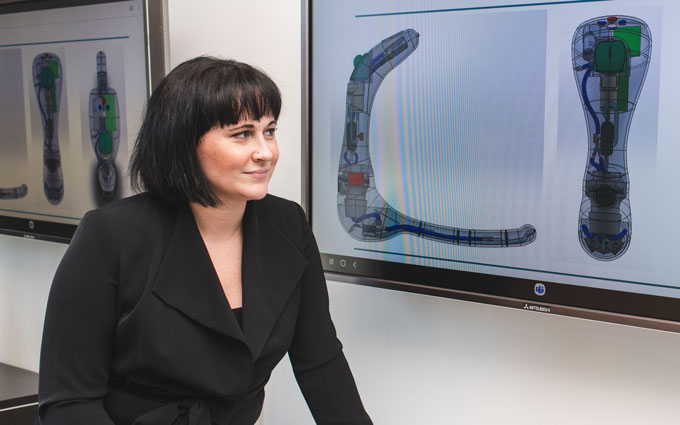With support from FACIT, Hyivy Health aims to improve pelvic rehabilitation with a new, patient-centred device.
It was painfully obvious to Rachel Bartholomew back in 2019 that women’s pelvic rehabilitation needed to be brought into the 21st century.
Bartholomew was on bedrest, dealing with side effects from treatment for cervical cancer that “wreaked havoc” on her body. But she found the device that was meant to help her recover was causing her undue pain and didn’t seem designed for her body.
As an entrepreneur, Bartholomew recognized an opportunity to make pelvic rehabilitation more comfortable, more user-friendly and more effective.
“The device I was supposed to use just didn’t make sense,” Bartholomew says. “It seemed like the right time to make a change for myself and other women who go through this.”
Bartholomew used her downtime during recovery to design Floora, a new patient-centred technology to help women recover from pelvic health problems caused by cancer and other gynecological conditions.
Four years later, Bartholomew’s start-up Hyivy Health is manufacturing Floora in her hometown of Kitchener. And thanks in part to investments and support from FACIT, Bartholomew and Hyivy could be on the verge of shaking up women’s pelvic health.
The idea for Floora came to Bartholomew shortly after she was diagnosed with high-risk Stage 1B1 cervical cancer and underwent a full hysterectomy and radiotherapy. Like many women who undergo these invasive treatments, she faced a range of potentially long-term side effects including pain and neuropathy in her vagina and serious bladder issues.
At just 28 years old, her future was full of uncertainties. Would she need a urostomy bag? Could she ever enjoy being intimate with a partner again?
The solution she was given was a device called a vaginal dilator. Traditional dilators are a set of plastic or silicon tubes of varying sizes – which Bartholomew likens to Russian dolls – that are inserted into the vagina to help break down scar tissue and stretch out damaged muscles.
Bartholomew found that these dilators, which were designed in 1938, were painful and awkward to use.
“It felt like the design didn’t consider what women actually want and need,” she says.
She turned to a support group on Facebook and found that other women shared her frustration. And the issue went beyond just cancer. Dilators are used for recovery after childbirth, during menopause and after gender-affirming care, and Bartholomew felt users deserved better.
After speaking to about 500 women, she came up with a rough design and presented it to her radiologist while she was receiving treatment at the Grand River Cancer Centre in Kitchener. The idea quickly made its way around the local oncology community, and Bartholomew continued to do more research. Before too long, Bartholomew created Hyivy Health and built a prototype.
Floora is different from existing dilators in several ways, starting with a more anatomical shape – “women are not just straight lines,” Bartholomew emphasizes – that makes it more comfortable to use. It dilates by gradually filling two balloons with air, making it gentler than ‘static’ dilators. Floora also incorporates heat to make the pressure of dilation more tolerable for users.
Bartholomew says one of the most exciting parts of Floora is the pressure sensors, which can collect data about the user’s rehabilitation progress and feed it back to patients and doctors via an app. The device also features a heat sensor that can provide data about a woman’s general gynecological health, and could potentially help diagnose endometriosis and other conditions.
“That data can really empower women to understand what is happening with their bodies and make decisions with their healthcare professionals,” Bartholomew says.
In 2022, Bartholomew’s innovation caught the attention of OICR’s strategic partner FACIT, which supports commercialization of new cancer technologies discovered and developed in Ontario. Bartholomew pitched Hyivy and Floora at the 2022 FACIT Falcons’ Fortunes competition. Though she didn’t win the pitch competition, her story and entrepreneurial drive left a memorable impression. Later that year, Bartholomew was selected for a FACIT investment grant through the Prospects Oncology Fund, an Ontario-first source of dedicated capital that drives the advancement of transformative oncology discoveries by supporting proof-of-concept studies.
Bartholomew leveraged Prospects funding to submit its technology for regulatory approval by Health Canada. Then FACIT invested in Hyivy again in July 2023 through the Compass Rose Oncology Fund, which is designed to anchor and scale biotechs in Ontario. Capital from FACIT is now helping Hyivy run studies to validate Floora in healthcare settings, and take steps to make it available to women who need it. Bartholomew says FACIT also helped Hyivy make connections across the cancer community, which will help the device make a greater impact in the future.
“Rachel encouraged us with her strong business acumen and ability to recognize a challenge in women’s health and develop an innovative solution, especially as she continued to deal with her own health challenges,” says FACIT President Dr. David O’Neill. “FACIT is proud to support Rachel and other creative, resilient entrepreneurs across Ontario.”
Hyivy is set to launch a clinical trial to test Floora with patients at Grand River Cancer Centre. The company is also making inroads in the U.S., where they hope Floora will get approval from the Food and Drug Administration within the coming months.
Bartholomew is excited to offer women a more comfortable and more personalized tool to get their lives back after cancer and other pelvic health issues.
“I’m hoping we can help women feel more supported and connected to their care,” says Bartholomew. “I want to give them a better quality of life and help them stay healthier throughout their lives.”

